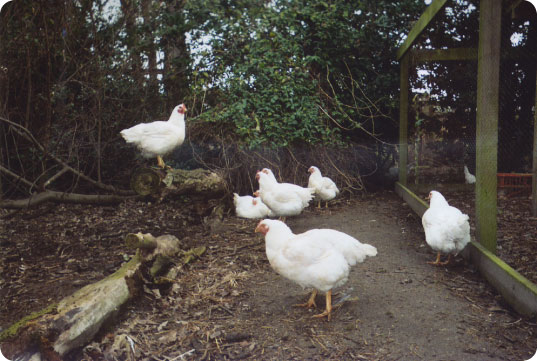I first heard of the ritual of Kaporos a few years after I founded United Poultry Concerns in 1990. A woman in Brooklyn called our office in the fall of 1994. In tears, she begged me to do something to help the hundreds of chickens who were stacked in transport crates on the city street where she lived. The chickens had been in the crates for days without food, water or shelter. She could hear their cries of distress from inside her apartment.

An Orthodox woman swings a chicken by the feet over the head of her child in a Kaporos ritual in Jerusalem. Image credit Reuters.
I began researching the ritual, which has various spellings including Kaporos, Kaparos, Kapparos, and Kapparot. It is translated as “atonement,”” “scapegoat” or “sacrifice.” The Kaporos chicken-swinging ritual is a custom dating to the Middle Ages. Hasidic practitioners in New York City, Los Angeles, Jerusalem and elsewhere wave chickens, held by their legs or suspended by their wings pinned backward, around their heads while chanting verses about transferring their sins and punishment symbolically to the bird in the days preceding Yom Kippur, the Jewish Day of Atonement. The chant basically says, “This chicken is my atonement, my substitute. This chicken will die for my sins and I will go on to a happy and peaceful life.” The chicken’s throat is then cut by a rabbi, who thrusts the dying bird, head down, into a funnel to struggle and bleed to death over a bucket.
Chicken Kaporos is a public ritual conducted under tents erected for the purpose on sidewalks and school grounds, in parking lots or fenced yards. It can be a small affair or a humongous horror show like the one in the Crown Heights neighborhood of Brooklyn, New York, where it goes on for hours, often all night until dawn. One chicken after another is pulled from a crate, waved over the head of the adult practitioner, infant or child, and then slaughtered for a fee paid to the rabbi. The cries of the chickens rise above the scene of carnage and mayhem in the streets until all of them are dead or are left dying in dumpsters.
Unused chickens may simply be abandoned in the crates when the ceremony is over. In 2005 and 2006, United Poultry Concerns adopted 65 Kaporos chickens confiscated by the American Society for the Prevention of Cruelty to Animals (ASPCA), who had been abandoned in a flooded parking lot, as well as a group of crated chickens locked in a garage whose cries caused a neighbor to call for help.

The chickens in this photo were rescued by the ASPCA from Kaporos abandonment in the Fall of 2005 and brought to our sanctuary. Photo credit Karen Davis.
The slaughtered chickens are said to be “given to the poor.” While some may be given or sold to the poor, the trashing of dead and dying birds in plastic garbage bags has been witnessed repeatedly in New York and Los Angeles. Rabbis opposing the ritual say that chickens subjected to the conditions of Kaporos cannot be considered kosher, i.e., edible, regardless of how they get wherever they are going.
United Poultry Concerns launched our first protest against chicken Kaporos in 1995, and The Alliance to End Chickens as Kaporos was Formed in 2010. The Alliance to End Chickens as Kaporos is an association of groups and individuals who seek to replace the use of chickens in Kaporos ceremonies with money or other non-animal symbols of atonement. The Alliance does not oppose Kaporos per se, only the cruel and unnecessary use of chickens in the ceremony.
The Alliance to End Chickens as Kaporos makes three principle arguments:
- The use of chickens in Kaporos rituals is cruel.
- The use of chickens in Kaporos rituals is not required by Jewish law.
- The use of chickens in Kaporos rituals can be replaced by waving coins or other inanimate tokens of atonement.
Yom Kippur, the Jewish Day of Atonement, is all about mercy, charity and repentance. Hurting animals violates the spirit of atonement rather than expressing it. Orthodox Rabbi Shmuly Yanklowitz pointed out the irony in The Jewish Week, noting that Kaporos observers “should be cultivating mercy for all those who suffer, and not be perpetuating pain on sentient creatures in the name of piety.”
There is a perfectly acceptable Kaporos practice that not only avoids animal cruelty, but can help reduce hunger and show compassion to all. Money can be used instead of sacrificing chickens, and funds raised can be given directly to charities. People ask mercy from God. The chickens need mercy from us. We ask Kaporos observers to show mercy and use money instead of chickens.
This week (September 12-17): Kaporos Chickens in NYC Need Your Help and Support!
 We need your help and support as part of our ongoing campaign to shut down the ritual animal sacrifice of Kaporos, which begins in only a few short days. We have hundreds of people ready to take a stand for the innocent victims, and we invite you to join us if you possibly can.
We need your help and support as part of our ongoing campaign to shut down the ritual animal sacrifice of Kaporos, which begins in only a few short days. We have hundreds of people ready to take a stand for the innocent victims, and we invite you to join us if you possibly can.
Featured image: Chicken, Vashon Island, Washington. Image credit Andrew Smith, CC BY-SA 3.0. All other images in this story via The Alliance to End Chickens as Kaporos.






3 Comments
This horrendous and evil practice is nothing but a bastardization of Jewish law which is overwhelmingly KIND to animals. It isn’t even Biblically-mandated – it is a 15th century European peasant CUSTOM, not a religious directive. The division of Judaism that indulges in this activity is an extreme distortion of Jewish values. Modern Judaism (Conservative, Reform, Reconstructionist, etc.) is frankly horrified by this.
Judaism teaches us to be role models of good behavior and to repair and fix the world. In the Old Testament, God chose his greatest leaders from shepherds, as His wisdom dictated that those who were kind to their flocks would be good to their people. It makes no sense that God would direct animal atrocities to be performed by His chosen people. And it makes no sense for any of these people to expect God to listen to their prayers when they so abuse His creatures.
If a chicken was so all-powerful as to absolve our human sins, we would not need God OR Yom Kippur! And if chickens are that powerful, we ought to treat them a hell of a lot better.
WE are the only ones responsible for our own transgressions. Kapporos only adds to our sins, not absolves us of them.
America is a free country. We have religious rights. If you don’t like it don’t participate; that’s your freedom of choice too.
We should put an end to Abortion too! Stop killing babies.